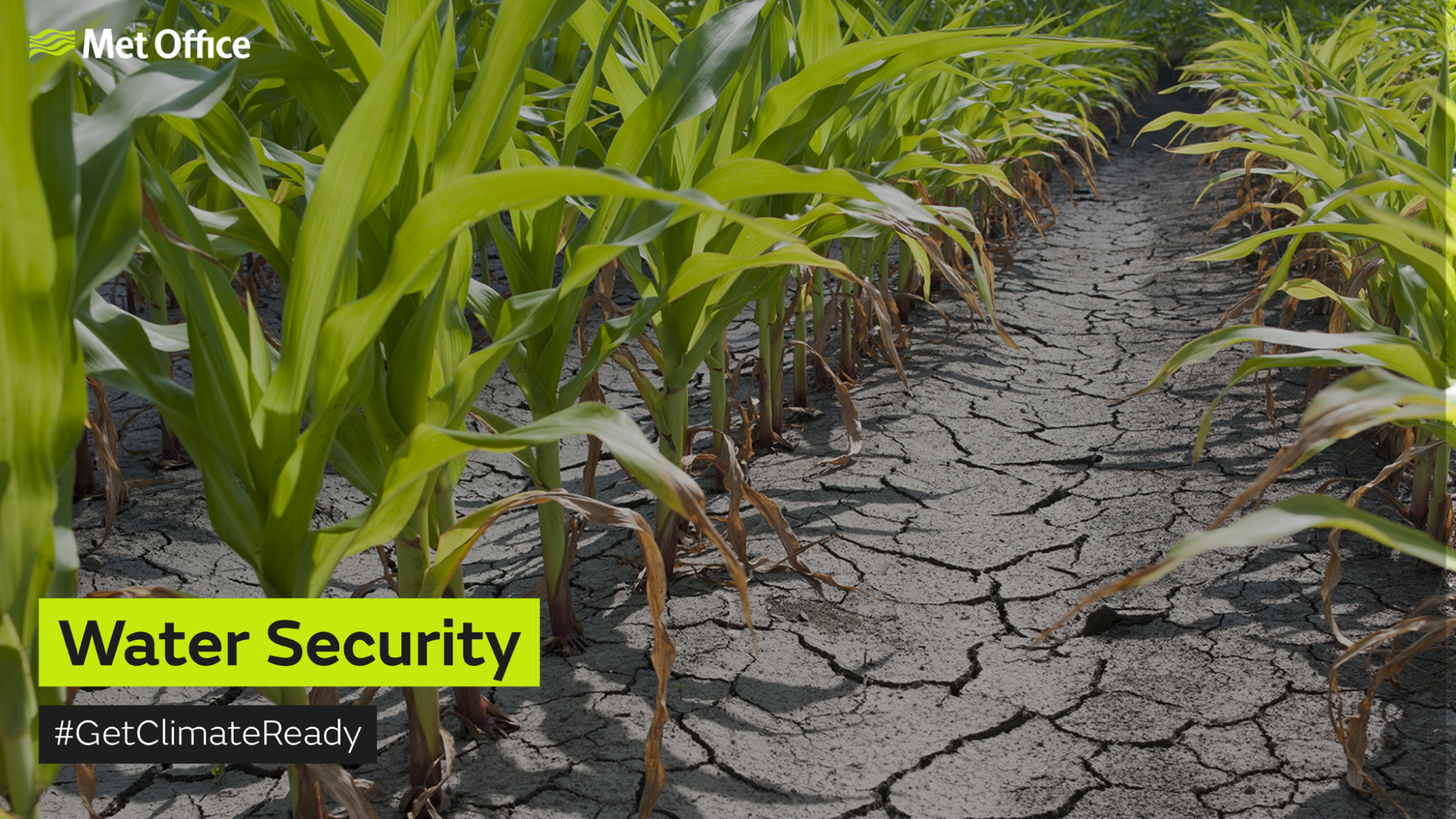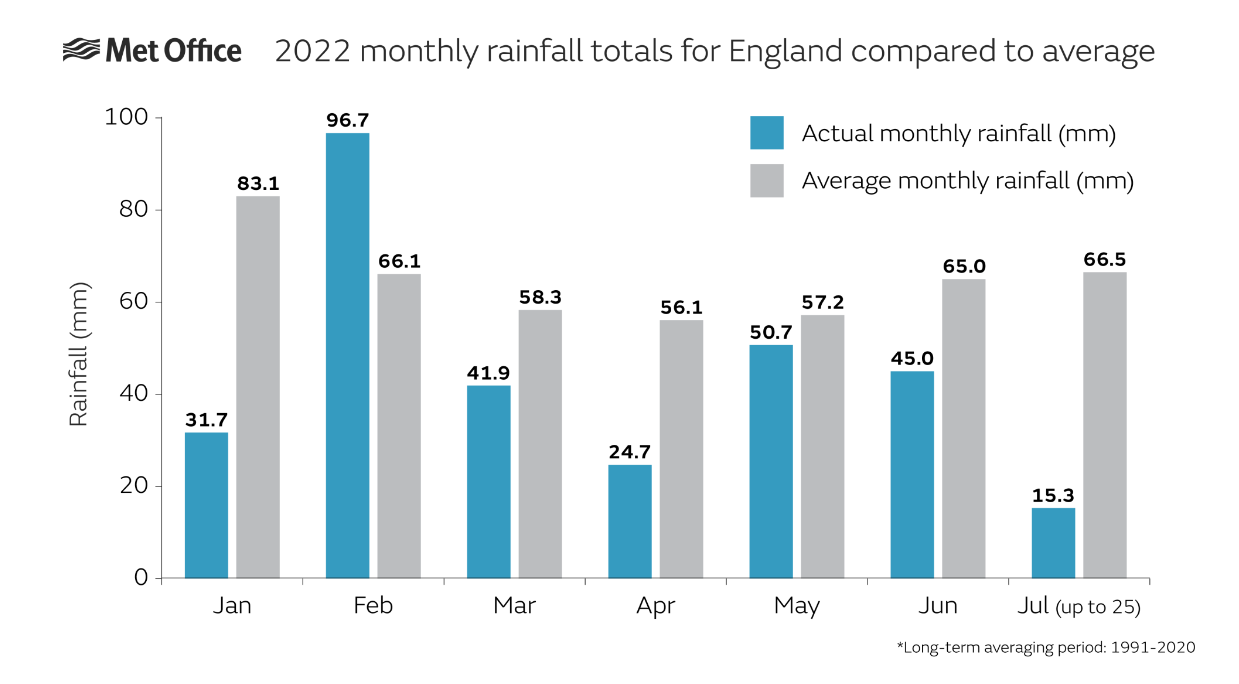2022 will be remembered for several meteorological events, including record-breaking heat and a prolonged drought. Eastern England was at the forefront of both events with East Anglia being the driest region in the UK relative to normal for the year.
Across the region, 2022 was the eighth driest year since 1836. During the year the region saw just over three-quarters (76%) of its annual rainfall, amounting to only 475.4mm.

Water security is this month’s Met Office climate theme. In this blog, Met Office Industry Consultancy Manager – Joe Osborne – describes his passion for ensuring the water industry work with world-leading weather and climate science.
Weather and climate events account for many of the key impacts on the water sector, especially in East Anglia. Translating the latest datasets and science into actionable information for decision-makers remains a substantial challenge. I am driven to ensure that organisations are resilient to present-day climate and prepared for future climate.

In my role as an Industry Consultancy Manager at the Met Office, I work closely with the UK water sector to ensure that our world leading weather and climate science is useful, usable and used.
How I got here
I joined the Met Office Industry Science and Consultancy team in June 2019, with a background in both weather and climate science and a particular interest in the hydrological cycle. I recognised that my passion sat at the interface of science and end-user, and I was keen to find a role where I was contributing valuable and actionable information. As such, I was excited to find myself working on several projects with customers in the UK water sector.
Fast forward to 2022 and I find myself leading our work with the water sector as an Industry Consultancy Manager. This is a multi-faceted role which involves working closely with colleagues in our Markets division to develop, build and maintain relationships with customers in the sector. These customers range from water companies, regional groups (alliances of water companies), the industry regulator (Ofwat is the body responsible for economic regulation of the privatised water and sewerage industry in England and Wales) and external consultancies. We work closely with our customers to understand the challenges that they are facing. It is then crucial to lean on scientific expertise to propose, develop and deliver bespoke analysis to support their key decision making.
Forward planning or event driven
The work that I lead can be broadly categorised as either forward planning or event driven. Forward planning work supports customers in furthering their understanding of climate risk. In one example, using novel approaches and new datasets, the Industry Consultancy team worked alongside Anglian Water to strengthen their understanding of drought risk – both for today and in a future, warmer world. This improved understanding enables Anglian Water to enhance their resilience to future drought events.

With just under 630mm of rainfall annually, East Anglia is the driest region in the UK. Remarkably East Anglia is renowned for its diversity of wetland features and landscapes, including the Fens, the Broads and chalk streams, such as this example in Lincolnshire. Picture: Anglian Water
In other work, we are working with water companies to understand the weather drivers of key impacts, including water quality, water demand and asset deterioration (for example, pipe bursts caused by phenomena such as freeze-thaw and/or shrink-swell). We also support water companies in embedding climate information into their regulatory reporting in a consistent and appropriate manner. For example, in ongoing work, we are supporting water companies in the consistent application of climate information in their Price Review 2024 (PR24).
Despite best intentions, weather events can often present challenges to the UK water sector. Therefore, there is an event driven element to the work we deliver. The year 2022 was a demonstration of this. Beneath the headline statistics, real-world industry impacts often emerge, some of them more obvious than others. The most obvious impact was on water resources from the dry start to the year, exacerbated by the exceptionally dry and hot summer. This led to a declaration of drought across many regions of the country. The record annual warmth also contributed to the hydrological situation, amplifying evapotranspiration and soil moisture deficits.

2022 monthly rainfalls for England compared to average
The Industry Consultancy team responded to this hydrological situation by putting the weather of 2022 into a longer, historical context for water companies. The hot summer also caused additional impacts, leading to record high water demand in some areas and a reduction in water quality of some surface water supplies. Despite a general theme of warmth in 2022, the first half of December was notable for a significant cold spell. This caused considerable issues with pipe bursts, due to the freeze-thaw of water.
Innovation and influence
Fortunately, through innovation and influence, the Industry Consultancy team can support customers in preparing for and responding to these events. We provide solutions and consultancy across timescales, from short-range weather prediction through to 50-year ahead climate projections. As an example, the Met Office Industry Consultancy team has built weather impact models to enable the forecast of water demand out to 10 days ahead. We are supporting Thames Water in an Ofwat funded project aiming to extend this modelling into longer range forecasting, which will help water companies to anticipate weather events beyond 10-14 days. However, we are also innovating to ensure consistent and seamless prediction across timescales. As such, we have recently completed a project coupling these same models with UK Climate Projection (UKCP18) data to present future scenarios of water demand, supporting adaptation planning.
A unique role
The role that we play is a unique one; observing industry needs while undertaking and applying novel science. We are therefore keen to influence, to ensure that the best science is being used within the water industry. As part of my role, I work closely with our Strategic Relationship Managers to ensure that relevant insights are shared with key collaborators and government stakeholders. This is particularly important where there may be new science or insights that could benefit the industry as a whole. The 2022 drought event (which is still ongoing in some regions) is a key example of this. Working with collaborators and sharing evidence around the changing meteorological drivers of UK drought in a warming world ensures that the resilience to such events is improved in both the short- and long-term.
We’re better together
Of course, while scientific and strategic leadership, as well as relationship management, are key to my role, the strength of our offering and delivery is due to the diversity and quality of individuals working in the Industry Consultancy team. Our diverse team is made up of statisticians, scientists, and consultants, with expertise spanning weather and climate timescales. Together we demonstrate a range of Met Office values. We’re experts by nature, contributing to and learning from world-leading science from within the Met Office (and further afield) to develop our consultancy offering. This ensures that we keep evolving; by pushing these boundaries we can make tomorrow better for our customers.


